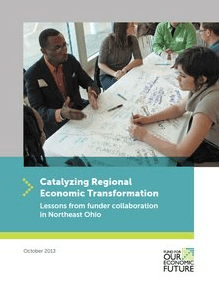
Collaborative values persistence in revitalizing regional economies
Brad Whitehead is president of the Fund for Our Economic Future, a collaborative that Knight Foundation helped form in 2004 to turn around the hard-hit economy of northeast Ohio. Knight and the Fund recently released a new report detailing lessons from the Fund’s first seven years, “Catalyzing Regional Economic Transformation.”
After 20-plus years with McKinsey & Co., I am well-accustomed to challenging environments. Yet, by most measures working collaboratively to transform a region’s economy has been more challenging than any of my corporate consulting experiences. Perhaps the clearest measure of how much more challenging our work is at the Fund for Our Economic Future is the number of times that I’ve failed to achieve the change spelled out in our operating plans and proposals from grantees. Thankfully the world of regional collaboration indulges a little more forgiveness than corporate consulting. Certainly the timelines are longer and that creates more opportunities to use our secret weapons: persistence and the willingness to fail forward.
As a colleague is fond of observing, “Bulldogs with friends win in the end.” Our Fund matches its tenacity with a commitment to working in partnership with our grantees. It is a combination that continues to pay dividends.
RELATED LINKS

Report: “Catalyzing Regional Economic Transformation. Lessons from funder collaboration in Northeast Ohio“
“Lessons in collaboration reach beyond the boundaries of NE Ohio” by Jon Sotsky and Carol Coletta Knight Blog
“Business accelerator jump-starts opportuniites in NE Ohio” by Laura Bennett on KnightBlog
“Business mentors guide growing startup” by Shawn Mastrian on KnightBlog
“Business, philanthropy unite around common economic goals in NE Ohio” by Daniel E. Klimas on KnightBlog
“NE Ohio fosters environment for entrepreneurship” by Tony Giordano on KnightBlog
“The power of convening and coordinating” by Wayne Watkins on KnightBlog
“Relationships enable NE Ohio startup to scale its business” by Jay Schabel on KnightBlog
Persistence and failing forward are so important because getting the solution right the first time out of the box is very challenging within the complex systems that shape our region’s economic competitiveness – even when the need is crystal clear. For example, economic research told us that if we were to transform our region’s economy we needed to reverse the decline of our manufacturing sector. We know that 44 percent of our region’s manufacturing jobs were lost between 1980 and 2007, yet manufacturing remains core to our region’s economy, representing 14.4 percent of jobs (compared to 8 percent in like-sized metros) and 18.2 percent of Gross Regional Product.
As is our practice, we started by focusing on the assets we have and asked: How can we make them better? Our region’s main asset to strengthen manufacturing in northeast Ohio was a long-standing organization supported by the federal government’s Manufacturing Extension Partnership, then known as the Cleveland Advanced Manufacturing Program (CAMP). Encouraged by compelling research and CAMP’s strong board leadership, our Fund supported a strategic overhaul and rebranding. As a result, CAMP was renamed the Manufacturing Advocacy & Growth Network or MAGNET for short. Alas, this did not work out as we had hoped. We quickly learned that the strategy was too broad in view of organizational capacity, the MAGNET brand was not aligned with market perceptions, and that a strong board sometimes is insufficient to overcome staff inertia. Perhaps most challenging, the organization was too isolated from the rest of the assets in the region.
Unfulfilled assurances that change was just around the corner only fueled doubt among Fund members, some of whom were prepared to cut off the grantee. Working with the MAGNET board leadership, we encouraged what we thought was bold action: consequently, the board brought in a new chief executive, recruited new board members and narrowed the strategy. Yet inertia and isolationism remained, and the organization remained stalled. We faced a choice: Stick with the existing grantee or find a replacement.
Knowing that change can take much longer than what is called for in any strategic plan, we stuck with MAGNET. Fortunately, several factors help put us back on track. Some of those factors were beyond our or our grantee’s control; global economic forces fueled resurgence in U.S. manufacturing and growing federal support of innovation within the manufacturing sector. Some factors we played a significant role in; we encouraged the organization’s new leader to embrace an opportunity to be part of a national showcase hosted by the Brookings Institution.
MAGNET’s participation in the showcase involved shaping an initiative focused on encouraging and supporting manufacturing innovation. The national showcase had its own deadlines and rigor that imposed an important outcome-focused discipline on the organization, which led to a major breakthrough within MAGNET. Board members rallied around the innovation project, gave it the support it needed and used it to frame a new vision for the organization’s role in transforming our region’s manufacturing sector.
Parallel with emergence of this new energy, MAGNET’s new staff leader has taken steps to overhaul the organization, unlock the potential of existing personnel and bring in new talent. Even more importantly, MAGNET has been reoriented to be more outward-facing, inking a broad set of deals with universities, research institutions and regional intermediaries to deliver the best that northeast Ohio can offer to its manufacturing companies.
After several years of travail, we are thrilled with what we are seeing! No one could have predicted the solution that emerged, nor can we predict the solution in any of the other complex systems where we work. What we can be certain of is that mistakes will be made, failure is likely—and hopefully productive as long as it informs future work—and the business of economic development system change requires persistence.
Recent Content
-
Community Impactarticle ·
-
Community Impactarticle ·
-
Community Impactarticle ·


